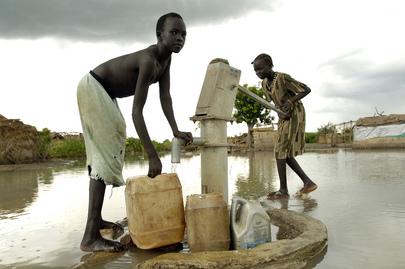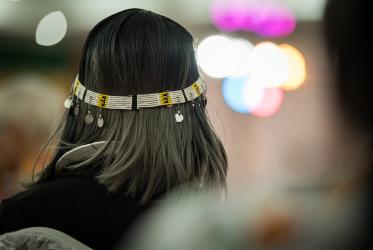Church representatives from around the world will gather in New York City 15-20 November to press three issues within the agenda of the United Nations: peoples being displaced by climate change, indigenous people's rights and Colombia's protracted internal conflict.
The United Nations Advocacy Week (UNAW) is organized annually by the United Nations Liaison Office of the World Council of Churches (WCC) in New York. It brings together over 80 people from more than 40 countries working on advocacy issues in churches, national councils of churches, specialized agencies, regional ecumenical organizations and regional advocacy networks.
"As churches we are pushing for an ambitious, fair and binding deal on climate change at the COP15 December meeting in Copenhagen, with a component that addresses climate displaced peoples. We want to bring this message forcefully into the UN system during the advocacy week," says Dr Guillermo Kerber, WCC programme executive for Climate Change.
Within the theme of climate change displacement two regions will be highlighted: the Pacific and Africa. "Pacific islands like Tuvalu and Kiribati will probably disappear in the coming decades because of rising sea levels. So churches in the region are already addressing the issue of resettlement," says Kerber. "In the Horn of Africa and the Great Lakes region, population displacement is a growing problem as changing weather conditions affect farming communities," he adds.
Sessions on indigenous peoples will focus on the United Nations Declaration on the Rights of Indigenous Peoples and how churches can engage with indigenous people's struggles, recognizing the churches' historic involvement in colonization and violence against indigenous peoples.
And the voices of Colombian people will enrich sessions on the conflict in this country and the churches' response to it. In Colombia, a long-running conflict has seen tens of thousands of civilians killed and more than two million Colombians driven from their homes.
Praying, speaking out and acting together
"The UNAW is a call to ecumenical advocacy in the global arena," says Rev. Christopher Ferguson, WCC representative to the United Nations in New York. "The Advocacy Week is a crucial moment for the churches to come together to speak to these burning issues. The UN in New York is the new ‘public square’ in a world in crisis. The voice of the church, standing with those whose life and being is threatened, must be heard."
This year the UNAW is being run in partnership with the Global Platform for Theological Reflection, a meeting of members of churches, specialized ministries, ecumenical organizations and theological institutions taking place 20-22 November in New York.
The Global Platform's meeting will be held immediately after the UNAW, with the theme "Praying, speaking out and acting together – Theological reflection on advocacy".
The 20 Global Platform participants will attend the UNAW, helping to ensure that the advocacy efforts of the churches are based on sound theological foundations. And the practical experiences of these participants at the UNAW will inform discussions at the Global Platform.
"These two events together will attempt to articulate a new rationale for churches' active engagement in the public sphere particularly in the context of massive abuse and destruction of life in the world today," says Rev. Dr Deenbandhu Manchala, programme executive for Just and Inclusive Communities and convener of the Global Platform.
"What is heard and learned during the week will help to discern what needs to be said to the churches and the ecumenical community about the vocation of speaking truth to power and of being in the vanguard of justice and life," notes Manchala.
Launched in 2007, the Global Platform is a space for stakeholders of the WCC to address issues of critical importance to the life and work of the ecumenical community.
Media contact in New York: Mark Beach, +41 (0)79 507 6363 (mobile)
More on the United Nations Advocacy Week of the WCC
More on the Global Platform for Theological Reflection
WCC programme on Public Witness: Addressing Power and Affirming Peace







